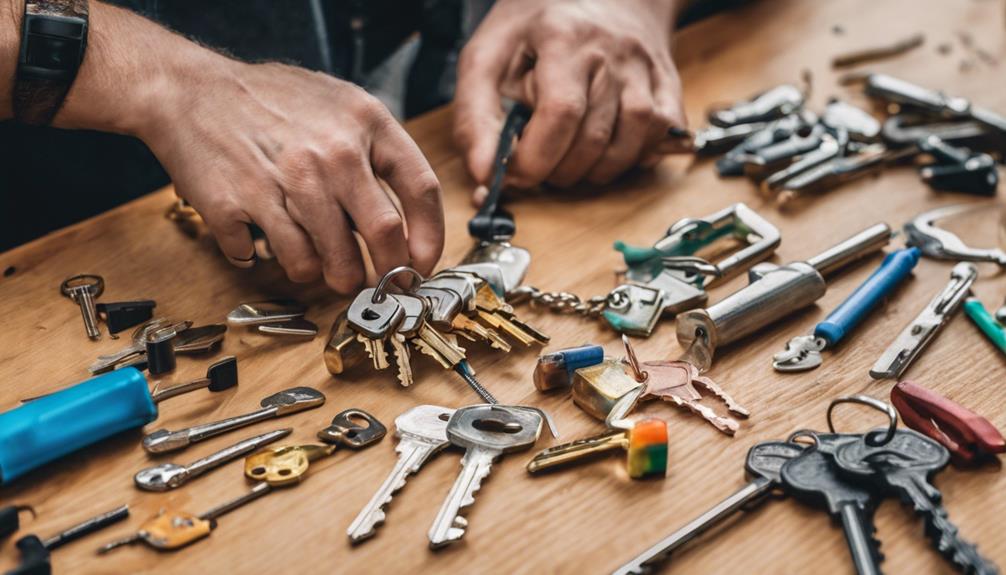DIY lock re-keying is definitely worth considering if you're looking to improve your home security on a budget. It allows you to secure your locks without the hassle and cost of full replacements. By spending around $20 to $50 for a rekeying kit, you can potentially save hundreds compared to hiring a locksmith. However, it does require some basic tools and a bit of patience, especially if you're new to it. If you're up for the challenge, you'll gain valuable skills and boost your self-sufficiency around home security. There's plenty more to uncover about the process and its benefits.
Key Takeaways
- DIY lock re-keying is a cost-effective solution, typically costing $20 to $50 compared to $75 to $200 for professional services.
- It enhances home security by allowing you to change the functionality of existing locks without complete replacement.
- Learning the re-keying process can be time-consuming and requires a basic understanding of lock mechanisms and attention to detail.
- Mistakes during DIY re-keying can compromise security, so following instructions meticulously is essential to avoid issues.
- Successfully mastering re-keying promotes self-sufficiency and can lead to future savings on lock maintenance and security.
Understanding Lock Re-keying
Understanding lock re-keying is essential for anyone looking to enhance their home security without the expense of replacing entire locks. By opting to re-key, you can maintain the integrity of your existing locks while ensuring that only new keys will function, thereby enhancing your security.
If you're considering DIY lock rekeying, you might wonder, "Should I rekey my own locks?" The answer depends on your comfort level with tools and mechanical tasks. Unlocking Savings highlights the potential financial benefits of this approach.
Re-keying allows you to change the internal pins of your locks so that old keys no longer work. This process can be a rewarding way to serve your home's safety.
However, there are DIY rekeying pros and cons to weigh. On the plus side, rekeying can save you money and give you a sense of accomplishment. You'll gain valuable skills and can quickly address any security concerns.
On the flip side, if you're not familiar with lock mechanisms, you might risk damaging your locks or creating a security vulnerability. It's vital to follow clear instructions and use the right tools.
Before diving into the task, evaluate your confidence in handling lock rekeying. Whether you choose to tackle this project or seek professional help, ensuring your home's security is always a worthy endeavor.
Cost Comparison: DIY vs. Professional
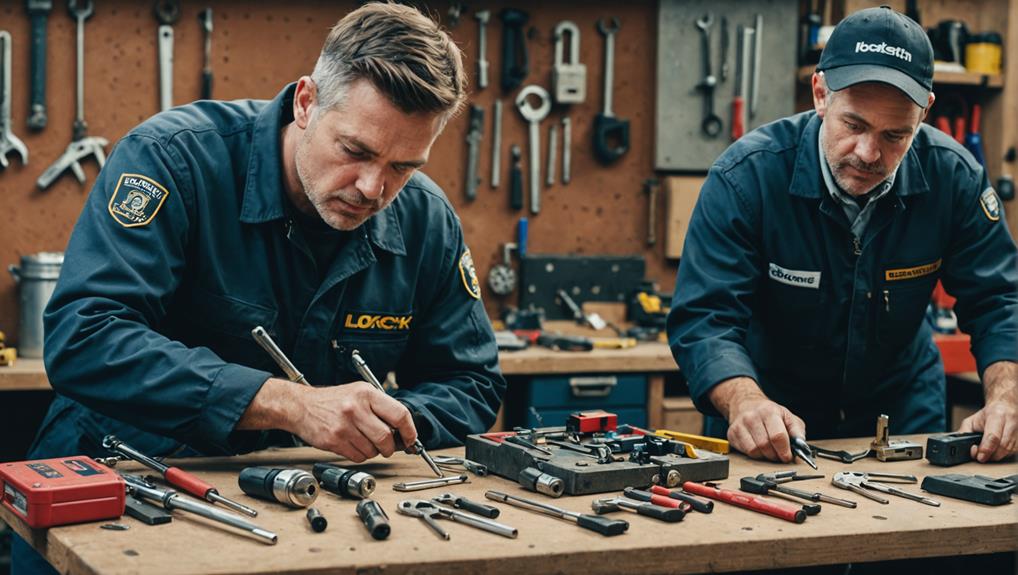
When deciding whether to take on lock re-keying yourself or hire a professional, cost is a significant factor. If you choose to rekeying yourself, you'll typically spend around $20 to $50 on a rekeying kit, which includes tools and replacement pins.
This option can be quite budget-friendly, especially if you plan to rekey multiple locks or want to help friends and family with their security needs. Additionally, many DIY enthusiasts find the process rewarding and empowering, as they learn valuable skills along the way.
However, it's important to evaluate the detailed cost comparison between DIY and professional services before making your decision.
On the other hand, hiring a professional locksmith can cost anywhere from $75 to $200 per lock, depending on the complexity and location. While you're paying for expertise, this option offers peace of mind and guarantees the job's done correctly.
Ultimately, the cost of DIY rekeying often appeals to those who love to lend a helping hand and enjoy a challenge. However, if you're not confident in your skills or have complex locks, the investment in a professional can save you time and potential headaches.
Weighing the costs against your ability and the importance of security will help you decide which route serves you best.
Time Investment for DIY
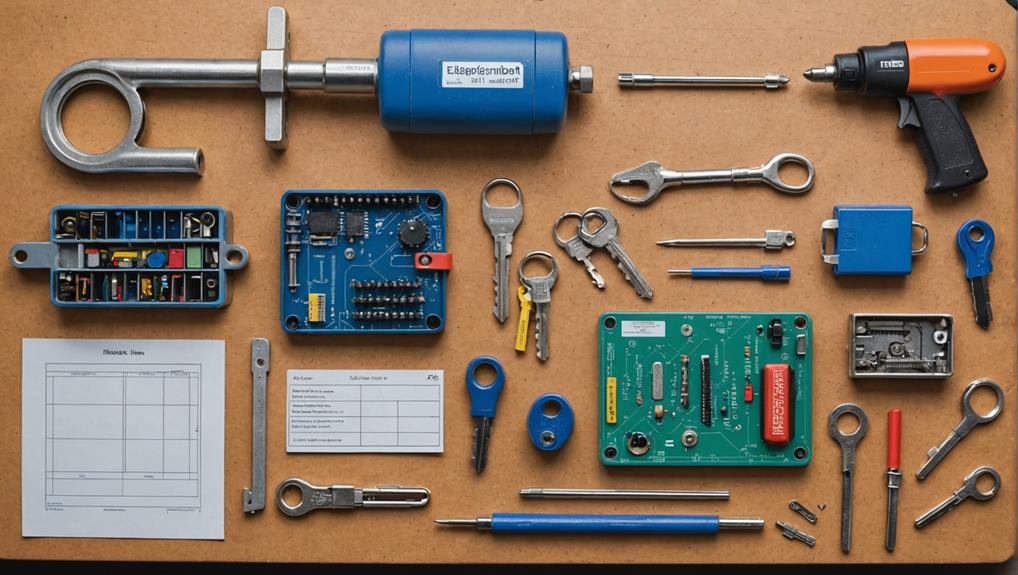
Taking on a DIY lock re-keying project can be a time-consuming endeavor, especially if you're new to the process.
You'll likely need to set aside a few hours to familiarize yourself with the lock system and gather everything you need, including a lock re-keying kit. Each step requires your attention, from removing the lock to replacing the pins accurately, as detailed in common challenges you might face along the way.
If you're aiming to help others by re-keying locks, consider the time it takes to educate yourself on the specific locks you're working with.
You may find yourself watching instructional videos or reading guides. This preparation is essential in ensuring you serve your family, friends, or community effectively.
Once you're ready to start, the actual re-keying process can take an hour or more, depending on how many locks you're working on.
Remember, patience is key—rushing through it can lead to mistakes.
In the end, while the time investment may seem significant, the reward of providing secure access for those in your care can be incredibly fulfilling.
Just weigh the time against how much you value the service you're offering and whether it aligns with your goals.
Required Skills and Tools
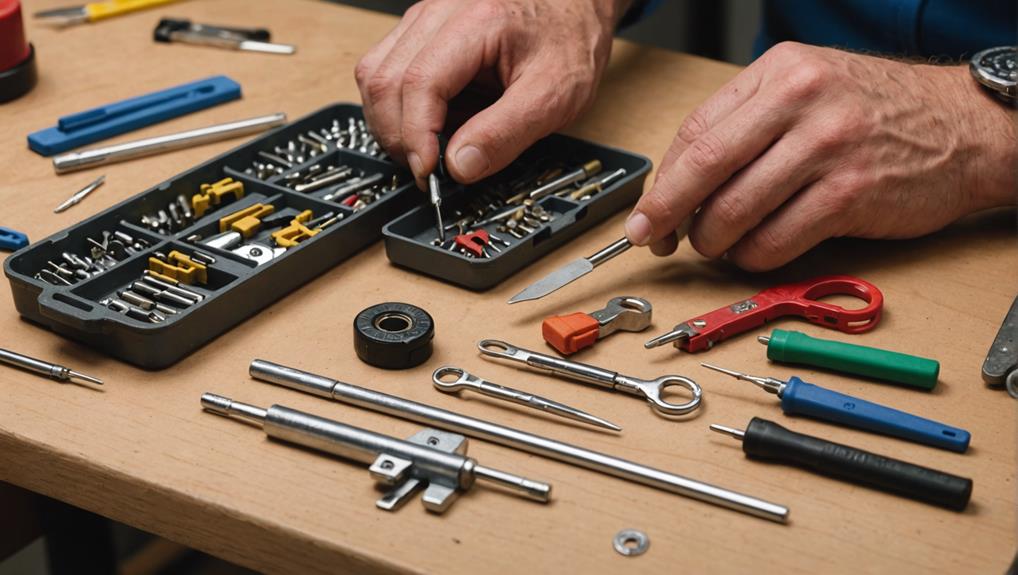
Successfully re-keying locks requires a solid grasp of several key skills and the right tools at your disposal. First, you should have a basic understanding of how locks function. Familiarize yourself with the internal mechanisms, such as pins and springs, so you can troubleshoot any issues that arise during the re-keying process.
Additionally, knowing the essential tools for re-keying can greatly enhance your efficiency and effectiveness during the process.
Next, attention to detail is vital. You'll need to carefully align new pins to match the new key, ensuring they fit snugly and operate smoothly. Patience is also a must, as the re-keying process can be meticulous and requires focus.
As for tools, you'll need a re-keying kit, which typically includes a key decoder, a pin kit, and a follower. A screwdriver and pliers are also essential for disassembling locks. A flashlight can help illuminate tight spaces, making it easier to see what you're working on.
Having the right workspace is important too—ensure you have a clean, organized area where you can lay out your tools and parts.
With these skills and tools, you'll be well-equipped to tackle the re-keying process, ultimately serving others by enhancing their security.
Step-by-Step DIY Process
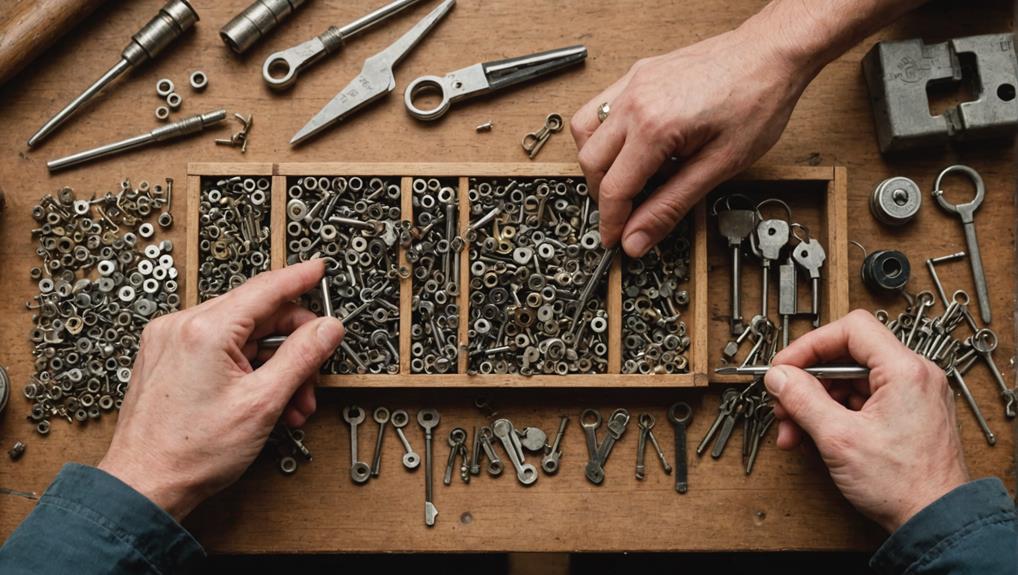
Re-keying your lock can be a rewarding DIY project that enhances your home's security. By taking on this task, you not only improve your safety but also gain a sense of accomplishment.
It's important to choose the right tools and understand your lock type before you begin. For guidance on selecting the perfect re-keying kit for your needs, consider choosing the right tools.
Here's a straightforward step-by-step process to guide you:
- Gather Your Tools: Start by collecting the necessary tools, including a re-keying kit, a screwdriver, and a pair of pliers. Make sure you have the new pins that fit your new key.
- Disassemble the Lock: Using the screwdriver, carefully remove the lock from your door. Take note of the order of the parts as you disassemble it, so you can reassemble it correctly.
- Replace the Pins: Open the lock cylinder and remove the old pins. Replace them with the new ones according to your new key's configuration. Reassemble the lock, ensuring everything fits snugly.
Potential Risks and Challenges
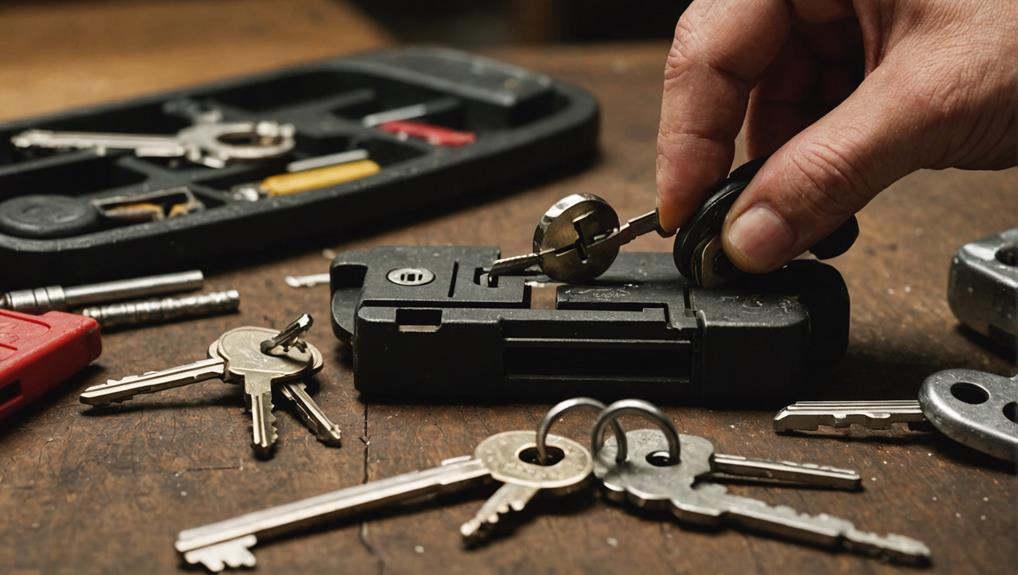
When tackling a DIY lock re-keying project, it's vital to be aware of the potential risks and challenges that can arise. First, you might find that the tools required aren't readily available or that you lack some necessary skills. Without the right experience, you could accidentally damage the lock, making it unusable and forcing you to buy a new one.
Additionally, many DIY enthusiasts underestimate the complexity of re-keying a lock, which can lead to mistakes that compromise the entire process. According to DIY vs. Professional Re-Keying, without proper knowledge, you mightn't even have the right tools or techniques to complete the job effectively.
If you don't follow the instructions carefully, you could end up with a lock that doesn't function properly, compromising your security. This could leave you vulnerable to break-ins, which is the exact opposite of your goal. There's also the risk of frustration when things don't go as planned, which might lead you to rush and make mistakes.
Moreover, if you're re-keying multiple locks, keeping track of the different keys and their corresponding locks can be overwhelming.
Finally, consider the possibility of warranty issues; some manufacturers void warranties if you attempt DIY repairs. By being mindful of these risks, you can decide if you're ready to take on this project or if it's wiser to call in a professional for assistance.
Final Thoughts on DIY Re-keying

When considering DIY re-keying, it's important to weigh the cost-effectiveness against the skill level required.
Complex lock types can present challenges that may be difficult for the average homeowner to navigate, making it essential to evaluate your capabilities. You might save money by doing it yourself, but make sure you're comfortable with the tools and techniques involved.
Additionally, situations where DIY re-keying may not be advisable can help inform your decision. Evaluating your abilities can help you decide if this is a project you want to tackle.
Cost-Effectiveness Analysis
Evaluating the financial implications of DIY re-keying can lead you to significant savings compared to hiring a locksmith. Not only does this approach empower you, but it also helps you allocate your resources more effectively.
Here are three key points to reflect on:
- Cost of Materials: Purchasing a re-keying kit typically costs between $10 and $30, depending on the brand and complexity. This is a fraction of what you'd pay a locksmith for the same service.
- Time Investment: While it might take some time to learn the re-keying process, the skills you gain can serve you well in the future. Once you've mastered it, you'll save time and money each time you need to change locks.
- Enhanced Security: By re-keying your locks yourself, you guarantee that you control who's access to your home. This not only saves you money but also provides peace of mind, knowing you've taken proactive steps for your security.
In the end, DIY re-keying isn't just a cost-effective solution; it's a way of serving yourself and your community by promoting safety and self-sufficiency.
Skill Level Requirements
Successfully re-keying your locks requires a certain level of skill and confidence, but it's more accessible than you might think. Many people assume it's a complex task, yet with the right tools and guidance, you can tackle it yourself.
The first step is familiarizing yourself with the lock mechanism. Understanding how pins interact is essential, and there are plenty of online resources that break it down effectively.
Start with simpler locks, like standard door locks, to build your confidence. You don't need to be a locksmith to re-key; just be patient and meticulous.
Gather a re-keying kit, which typically includes everything you'll need, and make sure you're working in a well-lit area.
Frequently Asked Questions
Can I Re-Key Any Type of Lock Myself?
You can't re-key every type of lock yourself. Standard pin tumbler locks are usually the easiest for DIY re-keying, but some locks, like high-security or electronic ones, often require professional tools or expertise.
Before you start, check your lock's design and manufacturer's guidelines. Having the right tools and knowledge is essential, so if you're unsure, it's better to consult a locksmith to guarantee safety and functionality.
What if I Lose the Original Key?
If you lose the original key, you might feel a bit stuck, but don't worry! You can still take action.
First, check if you have the lock's brand and model; you might find replacement keys online.
Alternatively, you can call a locksmith to help you out.
Remember, securing your home is vital, so act quickly to guarantee your safety.
Taking these steps can give you peace of mind and restore your access.
How Often Should I Consider Re-Keying My Locks?
You should consider re-keying your locks whenever you move into a new home, lose a key, or experience a security concern.
It's also wise to re-key after a roommate moves out or if someone you don't trust has had access to your keys.
Regularly reassessing your security every few years can keep your home safe.
Are There Any Legal Regulations on Re-Keying Locks?
Have you ever wondered if there are legal regulations on re-keying locks?
Generally, you're free to re-key your own locks, but laws can vary by location.
Some jurisdictions may require you to notify a landlord or have a professional do the work for security reasons.
Always check local laws to guarantee you're compliant.
Can Re-Keying Improve My Home Security?
Re-keying can definitely improve your home security.
When you change the locks or re-key them, you eliminate the risk of old keys falling into the wrong hands. It's an effective way to regain control over who can access your home.
Plus, it's often a more cost-effective solution than replacing locks entirely. By taking this simple step, you're not only securing your space but also ensuring peace of mind for yourself and those you care about.
Conclusion
In the end, deciding on DIY lock re-keying depends on your desire for DIY diligence and determination. If you've got the skills, tools, and time, it can be a satisfying solution that saves you some cash. However, if you're unsure, seeking professional help might be a safer choice. Weigh your wants and worries carefully, and you'll find the right route for your re-keying needs. Remember, it's all about balancing budget and peace of mind!

